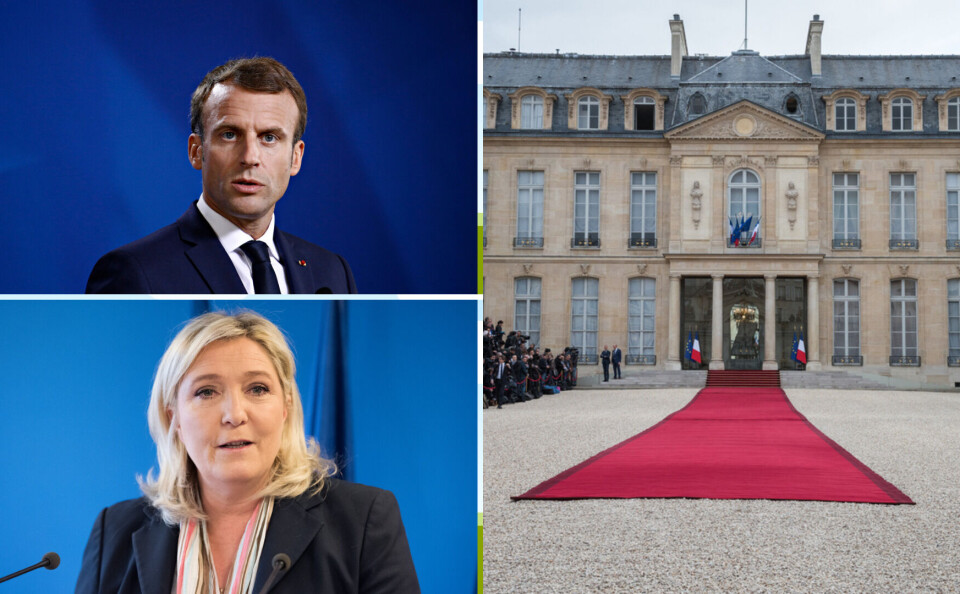-
Is it time to stop changing the clocks in Europe?
Campaigners say it would help improve health and also reduce traffic accidents
-
Gisèle Pelicot memoir hits sales top spot in France
The book, which has been translated into 22 languages, left Queen Camilla ‘speechless’
-
New tax on deliveries from outside EU: How will it affect customers?
The new charge will apply to all deliveries valued under €150
France’s presidential election: What happens after Sunday’s vote?
A new prime minister, the transfer of nuclear codes, an inauguration ceremony, the ‘third round’, the settling of accounts…We look at the key dates in the next few months

The French public will vote this Sunday (April 24) for the president who will lead the country for the next five years.
It is a choice between the self-styled centrist Emmanuel Macron (La République En Marche), who is going for a second successive term, and the far-right Marine Le Pen (Rassemblement National), competing in her third presidential election and hoping to become the country’s first female president.
The electorate will vote tomorrow between 08:00 and 20:00, after which early results will be announced. A more concrete idea of who the winner is will become apparent over the course of Sunday evening and into Monday morning.
But that is not the end of the election cycle. We outline below the next steps that will take place after Sunday’s vote.
New prime minister
At some point after Sunday’s vote, a new prime minister will be elected.
The position is currently held by Jean Castex, who took up the role on July 3. He has the option of remaining prime minister if Mr Macron is re-elected, but he has already announced that he will step down in the days following Sunday’s vote.
April 27: Official results
France constitutional court the Conseil constitutionnel will verify vote counts following the election and look into any disputes or discrepancies. Once that is done, the Conseil’s president, Laurent Fabius, will announce the official results on April 27.
These results are usually very slightly different from the count that is announced by media outlets the morning after the election.
For example, after the first-round of the election on April 10, the Conseil discredited 10,216 votes due to irregularities.
April 28: Transfer of power and inauguration ceremony
If Marine Le Pen wins, a ceremony to mark the transfer of power will be organised within two weeks of the second-round vote.
France’s government spokesman Gabriel Attal has said that this ceremony will take place on either April 27 or 28.
Ms Le Pen will be welcomed by Mr Macron on the steps of the Élysée Palace, before being led into his office for a discussion behind closed doors. It is at this moment that the codes for France’s nuclear weapons will be transferred to the new president.
Whether Ms Le Pen or Mr Macron wins, there will be an inauguration ceremony in the Élysée’s salle des fêtes
The ceremony opens with the results of the election being read out by the Conseil constitutionnel’s president, which the head of state (Mr Macron or Ms Le Pen) will have to sign off on.
The newly elected president will then be presented with the grand collier d’honneur de maître de la Légion d’honneur by the grand chancelier de l’ordre, before giving their inauguration speech.
See in the Tweet below a clip of Mr Macron receiving this honour after his 2017 election win.
Le général Benoît Puga, grand chancelier de la Légion d'Honneur, présente le grand collier de grand maître de l'ordre national à Macron pic.twitter.com/sErTnoxXdL
— franceinfo (@franceinfo) May 14, 2017
If a president is re-elected for a second term, the inauguration ceremony is usually toned down, as was the case when François Mitterrand and Jacques Chirac were re-elected in 1988 and 2002 respectively.
Campaigning for legislative elections begins in May
The voting does not end on Sunday, and in June France’s legislative elections will take place where the public vote for 577 MPs to represent them in parliament.
This election is sometimes referred to as the “third round” of the presidential elections.
The voting for the legislatures will take place over two rounds on June 12 and 19.
Candidates standing in the election will have until May 20 to declare it, and are allowed to begin campaigning from May 30.
Settling of the accounts
The 12 candidates who stood in the presidential election will have to submit details of their campaign expenses no later than June 24 to the Commission nationale des comptes de campagne et des financements politiques (CNCCFP).
By December 24 at the latest, the Commission must have approved, reformed or rejected the candidates' campaign expenses and decided on what reimbursement they are entitled to.
Candidates must have won at least 5% of votes in the first round of the election to get their campaigns fully reimbursed.
This rule has proven problematic for the candidate of Les Républicains, Valérie Pécresse, who won just 4.8% of the votes. She came out after the vote to say that her campaign cost €7million, of which €5million was her own money.
She has since been campaigning for donations to recoup some of her losses, and has reportedly already received around €1.4million.
Read more: French election candidates have to declare their wealth: Here it is
Ms Pécresse, along with the other presidential candidates, declared her wealth and assets in the lead up to the first round. She reported having €9.7million, more than any other candidate. This includes three homes with a total value of €4.1million, and art worth €60,000.
Related stories
Le Pen polling is closer than previous far-right matches in France
French election: What is a ‘vote blanc’ and does it achieve anything?
French election: Macron seen as arrogant but he wins TV debate in poll
























